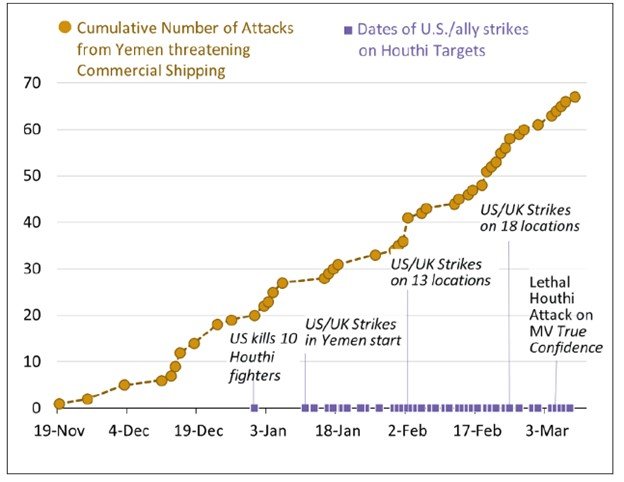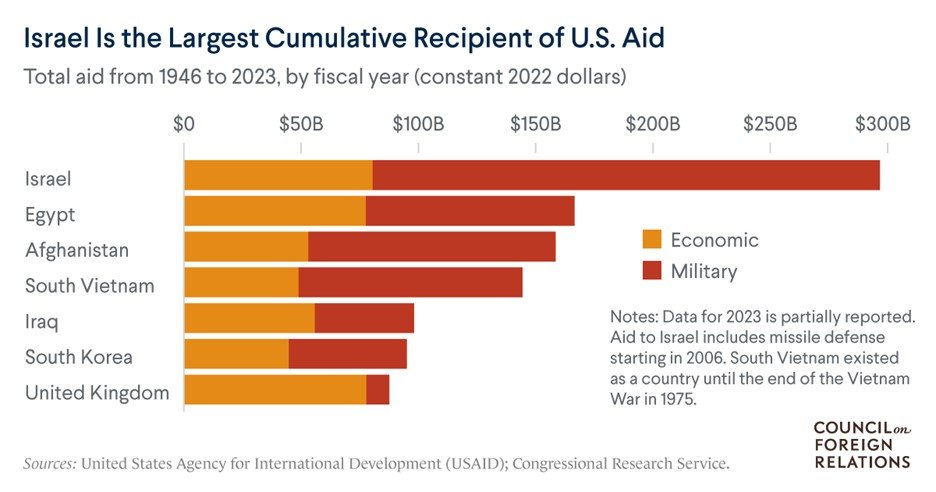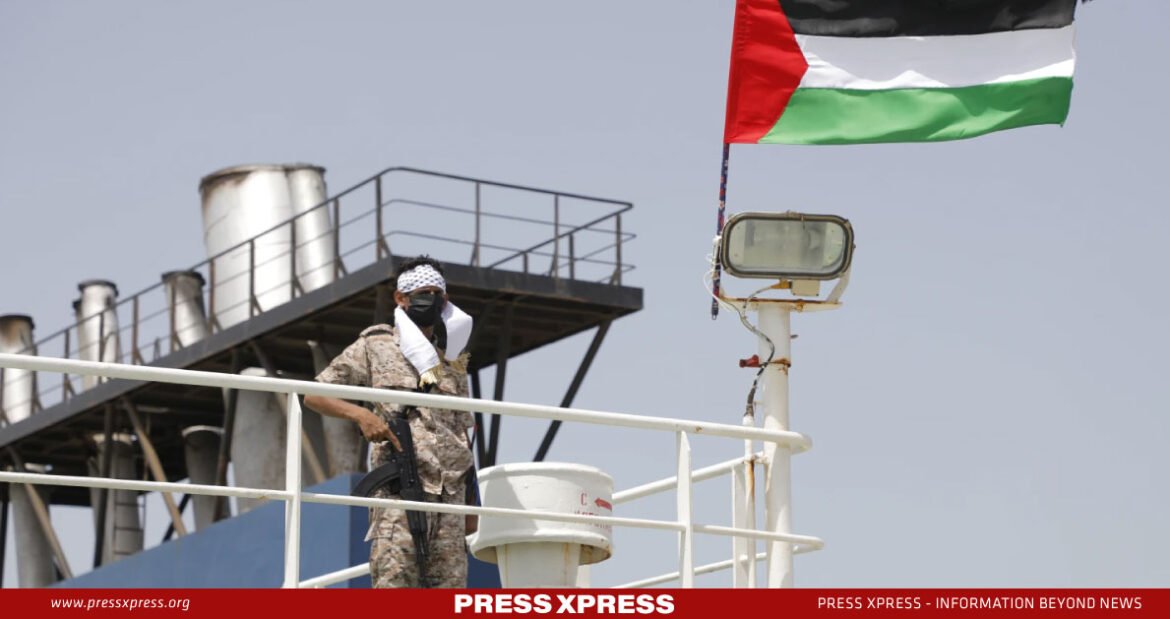The United States has recently called upon Iran to cease providing weapons to the Houthi rebels in Yemen. This appeal comes in the wake of a string of attacks targeting commercial vessels in the Red Sea. The Houthis, who receive support from Iran, have intensified their maritime assaults, posing a serious threat to international trade routes.
The US government asserts that these attacks not only disrupt global shipping but also contribute to heightened tensions in the region. The Red Sea serves as a critical corridor for international commerce, and any instability in this area can have widespread ramifications.
You Can Also Read: IRANIAN ACADEMIC HAILS BANGLADESH’S FIRM RESPONSE TO ISRAELI AGGRESSION!
In addition to its direct appeal to Iran, the United States is also seeking the support of the United Nations to exert pressure on Iran and curb the growing threat posed by the Houthis. This complex situation serves to highlight the intricate dynamics at play in the region and underscores the ongoing geopolitical tensions that continue to shape events in the Middle East.
Current State of the Red Sea
The Red Sea is currently experiencing a period of heightened maritime tension, as Houthi rebels have intensified their attacks on both commercial and military ships in the region. These attacks are primarily aimed at disrupting international shipping and are being carried out in protest against Israel’s actions in Gaza. In response to these attacks, the United States and the United Kingdom have launched joint airstrikes on Houthi targets in Yemen, including missile storage facilities and air defense systems.

These actions have led to significant disruptions in the region, with some shipping companies now choosing to divert their routes around the Cape of Good Hope in South Africa, to avoid the Red Sea altogether.

While this alternative route helps to ensure the safety of the ships and their crews, it also results in increased shipping times and costs. In addition to these disruptions, a recent attack on the vessel Rubymar has caused an oil spill in the area, raising serious environmental concerns.
The Triggers Behind US Demand to Iran
Intelligence reports suggest that Iran has been supplying the Houthis with advanced weaponry, including missile components and drones, which the rebel group has subsequently used to target ships associated with Israel and other nations.
The Houthis have justified these attacks as a form of retaliation for Israel’s military actions in Gaza, adding a complex layer to the situation by intertwining the ongoing conflict in Yemen with the broader geopolitical dynamics of the Middle East.
Economic Impact
The longer the duration of these disruptions, the more likely shipping rates will stay elevated — if not increase further.”
– Nora Szentivanyi, Senior Economist, J.P. Morgan

The Houthi attacks on Red Sea shipping lanes are causing significant disruptions to global trade, as many shipping companies are now forced to reroute their vessels around the Cape of Good Hope.
This alternative route adds over 4,000 miles to their journeys, resulting in shipping times increasing by a staggering 30-50% and leading to a substantial rise in fuel and labor costs. Consequently, freight rates on Asia-Europe routes have experienced a nearly 170% surge in some cases, placing a heavy burden on the shipping industry.

The increased costs and delays resulting from these disruptions are having a profound impact on various sectors of the global economy. For example, several auto plants in Europe have been forced to temporarily shut down their operations due to delays in receiving essential parts from Asia.
Insurance premiums for ships transiting the Red Sea have skyrocketed, further compounding the financial strain on shipping companies. The International Monetary Fund has estimated that these disruptions could contribute an additional 0.7 percentage points to global core goods inflation in the first half of 2024, highlighting the far-reaching economic consequences of the ongoing crisis.
Egypt’s economy has also been particularly hard hit by the Red Sea crisis, with Suez Canal revenues experiencing a sharp 40% decline due to the reduced number of transits. This significant drop in revenue is exacerbating Egypt’s existing economic challenges, as the canal serves as a vital source of foreign currency for the country.
US Takes Actions Against Houthis but Stays Silent on Gaza
The United States has called upon Iran to end its support for Yemen’s Houthi rebels, a demand that comes amidst a surge in Houthi attacks targeting shipping in the Red Sea. The US has strongly condemned these actions.
However, when it comes to the situation in Gaza, the US has adopted a markedly different stance. The Biden administration has faced criticism for its subdued response to Israel’s military actions in the area, despite the high number of civilian casualties and allegations of human rights violations.

It should be noted that Houthi-led attacks so far have killed approximately 3 people and injured 5 others. While the death toll from Israel’s war on Gaza has surpassed 34,000. Despite the discrepancy in numbers, the US double standard of remaining silent reduces its claims of attempting to maintain peace and calm in the region.
Instead of condemning these actions, the US has largely supported Israel, going so far as to veto UN resolutions calling for humanitarian pauses and providing emergency military aid to the country. American aid to Israel amounts to the billions, with cutting-edge f-35 jets and precision munitions.

This double standard in US foreign policy is glaringly evident, as the country applies pressure on Iran over its support for the Houthis while simultaneously defending Israel’s actions in Gaza. This inconsistency will likely undermine the credibility of the United States when it comes to addressing human rights issues on a global scale.

The contrasting responses from the US government highlight a significant bias in its approach to these two conflicts. This discrepancy in US foreign policy has fueled accusations of hypocrisy and has weakened the country’s position on international human rights issues, calling into question its commitment to upholding these values consistently across all regions and conflicts.
Conclusion
The United States has been urging Iran to cease its support for the Houthi rebels in Yemen, citing the serious threats their actions pose to global trade and regional stability. However, the US continues to stand by Israel, even as the latter’s military operations in Gaza have resulted in a massive and overwhelming number of civilian casualties.
This inconsistency in the US approach to these two conflicts has severely undermined the country’s credibility and weakened its moral authority in the eyes of the international community. It can be argued that if the United States truly wishes to be a champion of human rights and a defender of international law, it must first address its own biases and double standards.
The US government’s failure to hold Israel accountable for its actions in Gaza, while simultaneously pressuring Iran over its support for the Houthis, is likely to lead many to question the sincerity of America’s commitment to upholding human rights and international norms.
If the United States is to regain its standing as a global leader and a genuine advocate for justice, it must be willing to apply the same standards to all nations, regardless of their political or strategic importance to US interests.


